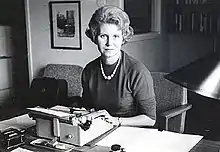Anu Kaipainen
Anu Kaipainen (née Mustonen; 14 March 1933 — 29 September 2009) was a prolific Finnish writer and literary critic.[1][2]
 Anu Kaipanen in 1963 | |
| Born | Aune Helinä Mustonen 14 March 1933 Muolaa, Finland[1] |
| Died | 29 September 2009 (aged 76) Helsinki, Finland |
| Occupation | Writer, critic, teacher |
| Language | Finnish |
| Education | Master of Arts |
| Alma mater | University of Helsinki |
| Notable works |
|
| Notable awards | Pro Finlandia (1983) |
| Spouse | |
| Children | 3, incl. Jouni Kaipainen |
Early life and education
Aune ("Anu") Helinä Mustonen was born in Muolaa, Karelia, to the school principal Johan Emil Mustonen and his second wife Signe Julia née Sjöblom.[3]
She completed her secondary education in Helsinki in 1951, after which she studied at the University of Helsinki, graduating with a Master of Arts in 1955.[3]
Career
Before dedicating herself to writing, Kaipainen worked as a Finnish teacher for several years.[3][2]
She had wide literary and cultural interests, contributing to literary criticism, as well as holding board and council roles at numerous literary and cultural organisations.[3]
Throughout the 1960s and 70s, Kaipainen served as city councillor in her home town of Kauniainen.[3]
Writing
Kaipainen's debut novel, Utuiset neulat, came out in 1960, followed by a poetry collection, Kädet helmassa, in 1961.[3]
Afterwards she published a new novel every couple of years — over 20, in total — as well as several plays and TV scripts, short stories and a fairytale book.[4][2]
Her 1967 novel Arkkienkeli Oulussa 1808-1809 ('Archangel in Oulu') is considered her breakthrough work, after which she became a full-time writer.[5]
Her 2002 novel Granaattiomena ('Pomegranate') was shortlisted for the Finlandia Prize literary award.[6]
Common themes in many of Kaipainen's works are on one hand myths and legends; on the other, contemporary realism and criticism of societal injustices and problems.[7][8] She felt that a novel must be written openly and honestly, without trying to sugar-coat difficult issues.[7]
Awards and honours
Kaipainen won the Finnish State Prize for Literature twice, in 1966 and 1969.[3]
In 1983, she received the Pro Finlandia medal of the Order of the Lion of Finland.[9]
She was awarded the state pension for artists (Valtion taiteilijaeläke) in recognition of her life's work, from 1994.[2]
In 2006, Kaipainen was recognised with the annual award (Suomen Kirjailijaliiton tunnustuspalkinto) of the Union of Finnish Writers.[4]
Personal life
In 1955, Anu Mustonen married the physician and later politician Osmo Kaipainen; the couple had three sons, the eldest of whom was the composer Jouni Kaipainen.[3][8]
References
- "Anu Kaipainen". Helsingin Sanomat (in Finnish). 29 September 2009. Retrieved 28 June 2021.
- "Kirjailija Anu Kaipainen kuollut" (in Finnish). Yle. 29 September 2009. Retrieved 28 June 2021.
- Kuka Kukin On (Who's Who) (in Finnish). Helsinki: Otava. 1978. p. 332. Retrieved 28 June 2021.
- "Kaipainen, Anu". Kirjasampo.fi (in Finnish). Public Libraries of Finland. Retrieved 28 June 2021.
- "Anu Kaipainen". OuKa.fi (in Finnish). City of Oulu. 27 June 2018. Retrieved 28 June 2021.
- "Finlandia-ehdokkaat julkistettiin" (in Finnish). Yle. 14 November 2002. Retrieved 28 June 2021.
- "Kaipainen, Anu (1933-2009)". Kansallisbiografia.fi (in Finnish). National Biography of Finland. Retrieved 28 June 2021.
- "Kaipainen, Anu". Uppslagsverket.fi (in Swedish). Retrieved 28 June 2021.
- "SUOMEN LEIJONAN PRO FINLANDIA -MITALIN SAAJAT 1945-2020". Ritarikunnat.fi (in Finnish). The Orders of the White Rose of Finland and the Lion of Finland. 9 October 2020. Retrieved 28 June 2021.
External links
- Anu Kaipainen profile and bibliography on Kirjasampo (Public Libraries of Finland literary database; in Finnish)